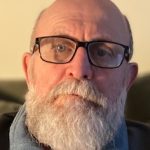Poetry Week 2023 First Place Winner!
BY MARK THOMAS
Copyright is held by the author.
Bus shelters are poems
written in litter and loneliness,
expressions of longing, punctuated
by scuff marks on plexiglass,
runes left by a hundred fidgety commutes.
The city’s inkwell must be filled
with cat food tins and dried flowers
djinn bottles, and diaper pins,
cigarette butts, and coffee cups,
and canted shadows from churches
and office towers.
It must be difficult
to compose a new poem each morning,
from feathers, Kleenex, and wasted hours,
then sign it with a squiggly coffee stain,
and release it to the sidewalk,
hoping it will get positive reviews.
The poem near my apartment
is a villanelle, enigmatic and playful,
the way poems are supposed to be.
Every afternoon there are nervous edits
to the fresh language of morning,
and every evening,
the city gropes for its misplaced pen,
eager to rework the tropes
and tweak the rhythm.
And every night,
a man curls up like a question mark,
knees to chest,
and sleeps in my favourite poem.
***

Mark Thomas is a retired teacher, rowing and wrestling coach. He lives in St. Catharines, ON.
